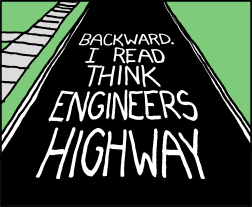I was reminded of this when, earlier today, I spoke with Robin Bush, one of the council members of the Society for Molecular Biology and Evolution (SMBE), and she mentioned something that challenges, not just the SMBE journals, but all scientists; how do we make dense, field-specific research accessible?
Leading to another person I worked closely with last year, Nate Brown, a mathematician with a passion for increasing the public's understanding and acceptance of evolution. Nate has been a real inspiration to me. He has boundless enthusiasm. Partner that with my overly-optimistic view of people's desire to learn, and we were unstoppable... till we ran into a tangle of red tape, and funding requests, and then his sabbatical, and now my trying to finish up my thesis... But, we still managed to produce a tangible product: a series of ads for public television designed to focus on style rather than substance. The aim is to increase awareness of and interest in science, without getting bogged down in the details. (Remind me and I'll post some of the ads later on - they're on a disc at work right now.)
Style versus substance.
Really, I think, this should be the goal. A couple years chairing the CFW Marketing committee helped me see this also. We are, or are becoming, a nation of news-bytes, computer-bytes. Tiny little chunks of what piques our interest. Something we can share with our family, our friends in 140 characters or less. That is how to spread science awareness, and increase enthusiasm. People really will dig in, if they're interested. I think our goal, however, should be to get them to the door.
I wouldn't be very appreciative of someone going into the details of
Hmmm... maybe a more appropriate example would be if my friend in Material Science wanted to explain all the details of her new project working with a new set of chemicals, A, B and D, and how they interact with this atomic compound of XZ to form...(eyes getting sleepy)... this special polymer that reacts under oxygen-depleted conditions... (my brain feels oxygen depleted)... to switch from a solid to a gas, but then returns to its original solid form.. (ooh! shapeshifting)... by breaking the hydrogen-nitrogen bonds... blah, blah blah...
I would politely listen, but would tune most of it out. Rather, if she told me, "I work with this cool material that can basically shape-shift, and could be used to make buildings. We're studying how we can change it from a solid state, to a gas, back to the same solid state. This could be applied to moving a large amount of this material through space with almost no effort!"
Not a lot of substance, but, "whoa, is that neat!?". It has the style factor. Something that anyone can understand, form an opinion on, and share.
The problem with scientists is that we're too preoccupied with having all the details correct. (Trust me, I know it is one of my character flaws to not accept even small inaccuracies in conversations - I'm sure it gets awfully annoying.) But, when it comes to promoting science, I think we need to learn to err on the side of style. Substance is thick. We get bogged down in substance. That isn't to say that our science shouldn't be rigorous, well-thought, and well-defended. It should. But, we need to learn to take a few steps back and accept that as fascinating as I find sexually antagonistic trait co-evolution, it's going to sound like a pile of "who cares" to someone following Brangelina's new spat. But Brad, Angelina, their fans and scientists (note that these are not mutually exclusive groups), are all voters, who choose who to send to congress, who decide whether basic-research is valid, and who deserve to know where their tax dollars are going, and why they should care.
So, after a long, winding road, I've reached my conclusion, that science outreach needs to focus on hooking our audience and highlighting the style. Yes, that also means we need to grin, and swallow the substance.





























